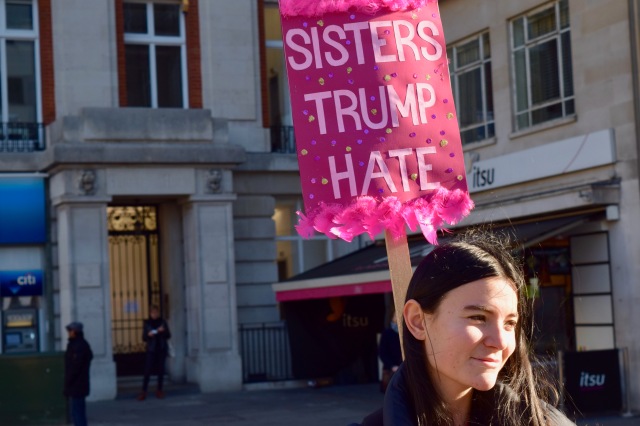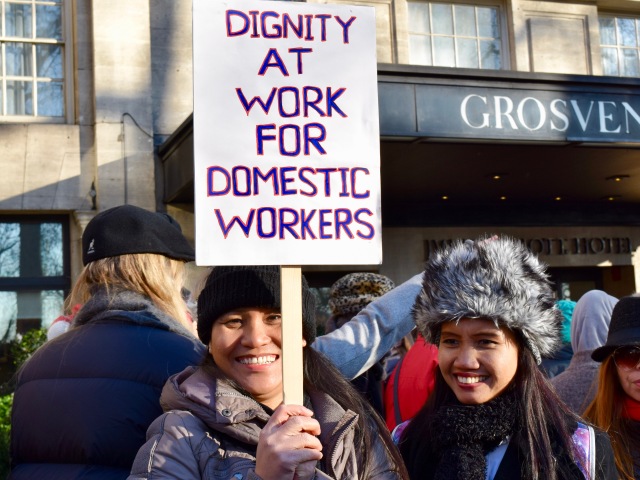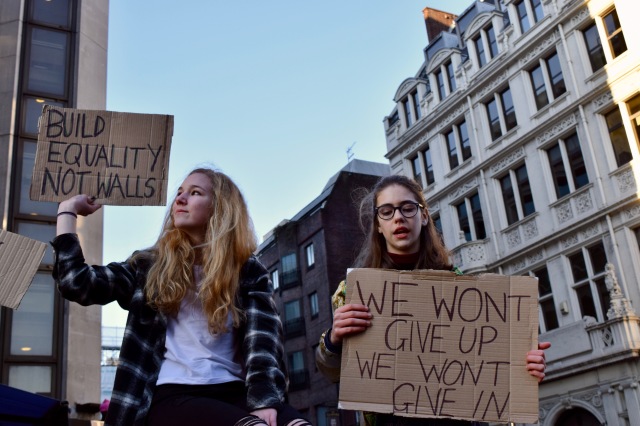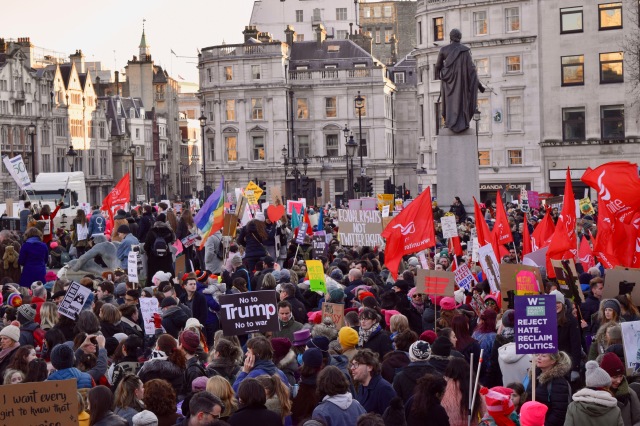TW: Sexual assault and harassment
Anonymous
It has been 8 months since I was sexually assaulted and harassed at work and nothing has been done.
I had been sexually assaulted by different men (once at a house party, 3 times in public) four times previously and had never reported it. I had always wanted to play down what had happened and did not want to re-traumatise myself by going through the process of a police investigation for what I knew were ultimately very minor sexual crimes. I did report an incident to the police once when a group of us were flashed on the way home by a drunk man who was out with his friends. I was so fed up and furious that I ran and asked for help and some lovely men tried to stop him leaving in a taxi while I called the police – it took them more than 40 minutes to arrive, by which point I had gone home and the man had escaped. When the police called me to follow up the next day, they said “he did not seem like a predator” and was “just drunk”. This was obviously a minor incident but it is my only personal experience of reporting a sexual crime to a higher power and it did not fill me with a great sense of optimism.
On starting work at a Secondary School in September, I naively thought that I would be safe from work place harassment. In my first week, however, I had already taken note of how creepy one of the PE teachers was. Every time he passed me in the corridor he would wink, and he inappropriately called my line manager “a two faced bitch” in one of the few conversations we had. He would leer at me in meetings, giving me those horrible looks that all women recognise. In short, he seemed like a creepy, sexist older man.
At the Christmas staff quiz he was sitting on my table. I had had a few glasses of wine and was chatting to various members of staff on my table. My memory is hazy due to the alcohol, but I remember him making some kind of comment along the lines of “you have a great figure” and as he said this, he put both his hands onto my thighs. It was over very quickly but it made my skin crawl. I tried to brush it off with nervous laughter and moved to a different seat. I attempted to forget about it, but had this nasty feeling that he was testing the waters to see how I would react, to see how far he could push his behaviour.
After the Christmas holidays I was at a year group briefing early before school in one of the classrooms. I was sitting at the back, the other members of staff were in front of me. He came into the room late and so people were joking about him being lazy – everyone was laughing about it. As the meeting started and the other members of staff were distracted, he walked close behind me, put his hand under my hair on the back of my neck and said confidently (but so nobody else could hear) “very pretty.” He then moved calmly across the room to sit on the other side from me.
I was so astounded that I actually started to say thank you before I fully realised what had happened and felt furiously sick. The meeting was only ten minutes, but it felt torturously long because I was hot with rage and so deeply disgusted. He was so much older than me, with a round head, sharky eyes and a terrible haircut – the hair was thinning, grey and crunchy. He always wore shorts which revealed his waxy legs. I was furious he thought he had any right to my body. How dare he leer at me, touch me. It brought back all of those memories of the times men had taken my body as their right, grabbing my vagina as I tried to turn off the smoke alarm at a party, undoing my bikini top on a beach where I was alone, living in a foreign country.
After the meeting finished, I immediately spoke to a woman teacher that I trusted and asked if she had heard him – she had not, but she agreed that I should report what had happened. I felt confident because his behaviour had been so inappropriate leading up to this (second) assault that I was sure they would deal with it – a string of incidents is surely more likely to show how calculated his actions were?
Unfortunately all that followed was a humiliating investigation, led by an older male member of the Senior Leadership Team who, frankly, did not have a clue. They followed procedure, they said, and told me they were carrying out a ‘formal investigation’ – an HR woman from the council came in to oversee the process. I was interviewed multiple times, crying openly in two of the meetings. This was humiliation enough as a young woman new to a job. I also had to drag one of my colleagues with me to the meetings as my support as I was not in a union yet (I had only been working there for a month and, stupidly, had not got round to joining).
I was sure that there would be some outcome – all I wanted was for him to admit he had harassed and assaulted me. I wanted my work place to see that I had been a victim of age and gender discrimination and to acknowledge that I did not feel safe or comfortable. Instead, after a horrific process over the course of two weeks, they decided there was not enough evidence to support what I had said (despite the fact he had admitted to saying what I told them). They told me that the problem was that they could not prove that the “unwanted sexual touching” had happened.
I was confused because I did not understand what process I had just been through. They had said it was a formal investigation but they then played it down saying it had actually just been informally working out what had happened. I tried to say that I did not care about the formalities and I just wanted to be believed and for him to understand what he had done. They offered for him to write an apology letter but this only infuriated me – how could he apologise for something he was denying he had done?
What is so frustrating is that they did not have any internal procedures in place to deal with structural issues like sexism. I can guarantee that this man never went through any kind of training about gender inequality and discrimination – how is this not a safeguarding issue? The man works with vulnerable children everyday as part of his job, yet the school were entirely incapable of taking seriously his harassment of a new, young colleague and how that could have the potential to be a serious issue for the children in the school.
I tried to explain to the investigating team that, for me, this was not just about the incidents themselves, but about the inherent power imbalance that was at play in everything that had happened. He was able to treat me in the way that he did because I was new, because I was young and because I am a woman. He was a long-standing member of staff who I feel was testing the waters with me from the minute I arrived to see what behaviour he could get away with.
Unfortunately, my experience is not unique and on the scale of sexual crimes, it is very minor – if I had reported this to the police, I would have had no hope whatsoever of getting any kind of justice. A 2016 TUC survey of 1,500 women cited 52% as having stated that they had been sexually harassed at work, and a quarter of those women experienced unwanted touching. This is a systemic issue and it is to the shame of the local authority school where I work that they have absolutely no training in place around these issues for staff.
It is 8 months on from this and it has been totally brushed under the rug. I asked for a meeting with the investigating officer when I received a whole staff email from my harasser wishing all of us “ladies” a happy international women’s day – he had attached a photograph of a man holding a bouquet of flowers… Aside from wanting to gag, I was apoplectic with rage that he had had the audacity to include me in his stupid, sexist email after everything that I had had to go through.
When I complained about this email I explained, yet again, that he very clearly had no understanding of how to behave towards female members of staff and asked whether there would be any training provided so that he could understand the string of terrible things he had done, and be able to put together some kind of formal apology. The investigating officer attempted to appease me by claiming to understand but, since that meeting, absolutely nothing has happened and they claim that no such training course exists.
I flinch every single time I pass my harasser in the corridor. I feel embarrassed and anxious anytime a member of staff from the PE department is near me. I worry that the Senior Leadership Team think I overreacted and lied. In short, it has made my life at work extremely difficult. I was referred for CBT by my GP and in those sessions truly realised how much anxiety work was causing me. Thankfully I am leaving in 4 weeks time, but I must endure those weeks knowing that nothing has been done.
My experience is part of a vast picture of harassment, intimidation and violence against women, LGBTQI+ and non-binary people within the work place. It is no shock to me that work places get away with creating and nurturing these unsafe spaces for us, but it is really important that people are aware of how widespread this kind of behaviour is. I wish I had had the strength to shout out in that meeting for him to get his hands off me, but in the moment, I froze.
We need strengthened unions that stand up for workers and protect us from harassment and bullying and proper training and development for members of the workforce who are sexist – it is disgusting to allow this cycle of sexual assault and harassment to continue. Thankfully, I am able to leave my workplace and move on to something else – although I suffered, ultimately, I have been able to keep living my life when, for others, this is not the case. Sexual harassment often causes women to be pushed out of work causing a devastating economic impact on the woman victim. It can cause Post Traumatic Stress Disorder and other serious mental health issues. It has a knock on effect to almost every part of the victim’s day to day life and a huge social impact within the workplace (if the woman has not felt like she has no other option but to leave).
We must continue to fight to kick sexual harassment out of the workplace and remember how many thousands of women, LGBTQI+ and non-binary people are impacted each year by the insidious sexist culture that pervades our work places.
















